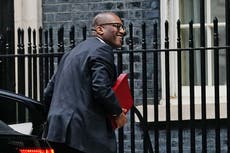UK families face £38bn hit from fuel bills as Rishi Sunak urged to give extra help
Price rises will have ‘hugely substantial impact’, says energy expert
Britain’s households are facing a £38bn hit on energy bills in the year ahead due to the soaring costs of wholesale gas and electricity, new analysis has found.
Chancellor Rishi Sunak is under growing pressure to set out extra help for families struggling with the cost of living crisis, as the war in Ukraine causes major spikes in energy prices.
Fuel bills are set to rise almost £700 in April when the energy price cap is raised – but experts are now warning that further increases are now “baked in” for the coming winter.
Regulator Ofgem will need to impose another 50 per cent rise in the energy price cap from October and push average energy bills over £3,000, economists at Investec and Goldman have estimated.
Analysts at Aurora Energy Research told the Financial Times the move would increase households’ gas and electricity consumption to £74bn in the year ahead, an increase of £38bn since last year.
“It’s a hugely substantial impact, especially on lower-income households,” said Dan Monzani, a managing director at Aurora Energy Research.
Last month Mr Sunak announced plans for an energy rebate loan, giving all households discounts of around £200 in October, which is then to be repaid over five years.
But the chancellor has so far resisted calls to take further action to ease some of the pressure on hard-pressed families from rising fuel bills.
Labour has called for extra help through a windfall tax on oil companies, with Sir Keir Starmer warning that families could see a further £1,000 spike in household bills this autumn.
Mr Sunak held meetings with several concerned Conservative MPs this week to listen to ideas on how to help households with soaring energy bills, PoliticsHome has reported.
One Tory MP said: “I’ve never seen the fear in people’s eyes that I’m seeing at the moment – people are genuinely scared. People are scared and I don’t blame them. He has got to do something.”
Some MPs are understood to have asked the chancellor if he could expand the support given to the poorest households, while he is also facing calls from Tory backbenchers to cut fuel duty and green levies from fuel bills.
On Friday, Mr Sunak said he would continue to “monitor” the economic impact of the Ukraine crisis. “We have provided unprecedented support throughout the pandemic which has put our economy in a strong position to deal with current cost-of-living challenges,” he said.
The chancellor added: “We know that Russia’s invasion of Ukraine is creating significant economic uncertainty and we will continue to monitor its impact on the UK.”
Money saving expert Martin Lewis has accused the government of trying to blame the Ukraine war for the cost of living crisis – when people were already at risk of “starving or freezing”.
Ahead of a mini-Budget in two weeks’ time, he urged Mr Sunak to take further action. “We are going to see a real increase in genuine poverty in this country, millions of people being thrown into poverty,” he told the BBC.
Join our commenting forum
Join thought-provoking conversations, follow other Independent readers and see their replies
Comments


Bookmark popover
Removed from bookmarks